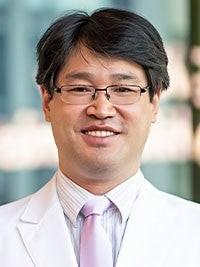PD Member of the Month

Eric Shang, MD, Program Director
Lehigh Valley Health Network
What is your personal background in vascular surgery education (how long have you worked in the vascular field, why did you choose vascular surgery, etc.)?
I was a graduate of a traditional 5+2 fellowship. I chose vascular surgery because it blends surgical skill and operative creativity with technological advancement in a way that I think is unique in the surgical subspecialties. I have been an attending for seven years, and have taught both integrated residents and traditional fellows at West Virginia University, The Cleveland Clinic and now at the Lehigh Valley Health Network.
What is the most rewarding part of your job? as a vascular surgery Program Director? What is the most challenging part of your job?
As we have just started our program, I suspect that my answers may change if you ask me the same questions next year. Currently, my answer to this pair of questions is the same: affecting the trajectory of someone’s career is both a hugely rewarding privilege and a monumental responsibility.
What are your personal goals within the vascular field?
In my surgical practice, I take seriously my oath to avoid the “twin traps of overtreatment and therapeutic nihilism” (Dr. Louis Lasagna, 1964). With regard to surgical training, my goals are to positively impact individual trainees as well as the broader field of vascular surgery training. In particular, I strive to teach excellent clinical judgement in addition to operative skill. I am working to make our program’s residency as humane, thorough, and innovative as possible.
If you had a blank check to change medical education in America, what would you do first?
One of the most daunting aspects of current medical education is the magnitude of investment, both monetarily and in terms of time. I was 35 before I became an attending physician, having gone straight from high school through four years of undergraduate education, four years of medical school, seven years of general surgery training (two were research) and two years of fellowship. An integrated vascular surgery residency condenses the post-graduate training timeline to five years. Furthermore, some institutions already successfully integrate medical school with undergraduate education. I would extend that implementation while also still offering a pathway for later-in-life entry. This approach would allow trainees to advance into practice more efficiently, saving time and costs without compromising safety. With a literal “blank check” I would fully subsidize medical education. Currently, student loan debts understandably exert significant pressure on the choices many doctors make about specialty and practice type. It would be beneficial to everyone if new doctors could focus on practicing medicine that they find personally fulfilling and compatible with their other goals for their lives.
From your perspective, what qualities make a successful vascular surgery applicant?
Successful applicants demonstrate a commitment to vascular surgery along with the courage to confront their own weaknesses. Medical knowledge can be taught and technical skills can be trained, but determination and unflinching diligence are essential to overcoming the inevitable obstacles along the way. “Not everything that is faced can be changed, but nothing can be changed until it is faced.” (James Baldwin, 1962)
What is a "fun fact" about yourself that you would like others to know?
My superpower is speed reading. I also collect and play vintage video games, particularly western and Japanese RPGs.
